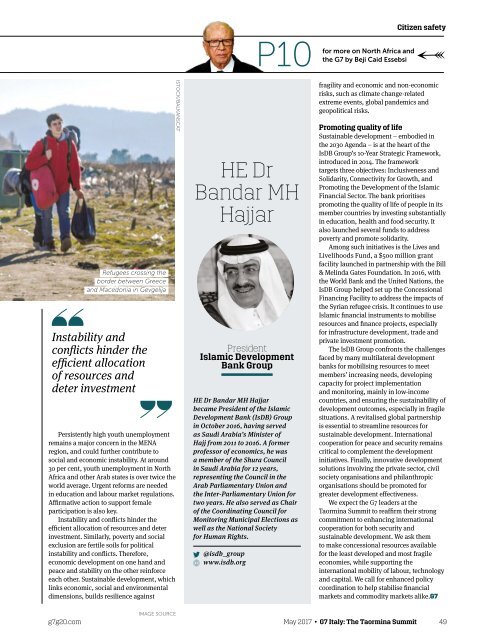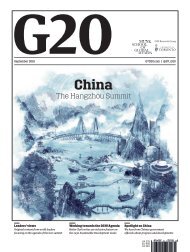G7 Italy-digi
G7 Taormina The 43rd annual Group of Seven (G7) summit, taking place in Taormina in Sicily, Italy, on May 26-27, 2017, will be an unusually important event. Its central participants, time, place, purpose and priorities will inspire it to act on the key issues that cannot be left alone for others later on.
G7 Taormina
The 43rd annual Group of Seven (G7) summit, taking place in Taormina in Sicily, Italy, on May 26-27, 2017, will be an unusually important event. Its central participants, time, place, purpose and priorities will inspire it to act on the key issues that cannot be left alone for others later on.
You also want an ePaper? Increase the reach of your titles
YUMPU automatically turns print PDFs into web optimized ePapers that Google loves.
Refugees crossing the<br />
border between Greece<br />
and Macedonia in Gevgelija<br />
Instability and<br />
conflicts hinder the<br />
efficient allocation<br />
of resources and<br />
deter investment<br />
Persistently high youth unemployment<br />
remains a major concern in the MENA<br />
region, and could further contribute to<br />
social and economic instability. At around<br />
30 per cent, youth unemployment in North<br />
Africa and other Arab states is over twice the<br />
world average. Urgent reforms are needed<br />
in education and labour market regulations.<br />
Affirmative action to support female<br />
participation is also key.<br />
Instability and conflicts hinder the<br />
efficient allocation of resources and deter<br />
investment. Similarly, poverty and social<br />
exclusion are fertile soils for political<br />
instability and conflicts. Therefore,<br />
economic development on one hand and<br />
peace and stability on the other reinforce<br />
each other. Sustainable development, which<br />
links economic, social and environmental<br />
dimensions, builds resilience against<br />
ISTOCK/BALKANSCAT<br />
HE Dr<br />
Bandar MH<br />
Hajjar<br />
President<br />
Islamic Development<br />
Bank Group<br />
HE Dr Bandar MH Hajjar<br />
became President of the Islamic<br />
Development Bank (IsDB) Group<br />
in October 2016, having served<br />
as Saudi Arabia’s Minister of<br />
Hajj from 2011 to 2016. A former<br />
professor of economics, he was<br />
a member of the Shura Council<br />
in Saudi Arabia for 12 years,<br />
representing the Council in the<br />
Arab Parliamentary Union and<br />
the Inter-Parliamentary Union for<br />
two years. He also served as Chair<br />
of the Coordinating Council for<br />
Monitoring Municipal Elections as<br />
well as the National Society<br />
for Human Rights.<br />
@isdb_group<br />
www.isdb.org<br />
P10<br />
the<br />
for more on North Africa and<br />
<strong>G7</strong> by Beji Caid Essebsi<br />
Citizen safety<br />
fragility and economic and non-economic<br />
risks, such as climate change-related<br />
extreme events, global pandemics and<br />
geopolitical risks.<br />
Promoting quality of life<br />
Sustainable development – embodied in<br />
the 2030 Agenda – is at the heart of the<br />
IsDB Group’s 10-Year Strategic Framework,<br />
introduced in 2014. The framework<br />
targets three objectives: Inclusiveness and<br />
Solidarity, Connectivity for Growth, and<br />
Promoting the Development of the Islamic<br />
Financial Sector. The bank prioritises<br />
promoting the quality of life of people in its<br />
member countries by investing substantially<br />
in education, health and food security. It<br />
also launched several funds to address<br />
poverty and promote solidarity.<br />
Among such initiatives is the Lives and<br />
Livelihoods Fund, a $500 million grant<br />
facility launched in partnership with the Bill<br />
& Melinda Gates Foundation. In 2016, with<br />
the World Bank and the United Nations, the<br />
IsDB Group helped set up the Concessional<br />
Financing Facility to address the impacts of<br />
the Syrian refugee crisis. It continues to use<br />
Islamic financial instruments to mobilise<br />
resources and finance projects, especially<br />
for infrastructure development, trade and<br />
private investment promotion.<br />
The IsDB Group confronts the challenges<br />
faced by many multilateral development<br />
banks for mobilising resources to meet<br />
members’ increasing needs, developing<br />
capacity for project implementation<br />
and monitoring, mainly in low-income<br />
countries, and ensuring the sustainability of<br />
development outcomes, especially in fragile<br />
situations. A revitalised global partnership<br />
is essential to streamline resources for<br />
sustainable development. International<br />
cooperation for peace and security remains<br />
critical to complement the development<br />
initiatives. Finally, innovative development<br />
solutions involving the private sector, civil<br />
society organisations and philanthropic<br />
organisations should be promoted for<br />
greater development effectiveness.<br />
We expect the <strong>G7</strong> leaders at the<br />
Taormina Summit to reaffirm their strong<br />
commitment to enhancing international<br />
cooperation for both security and<br />
sustainable development. We ask them<br />
to make concessional resources available<br />
for the least developed and most fragile<br />
economies, while supporting the<br />
international mobility of labour, technology<br />
and capital. We call for enhanced policy<br />
coordination to help stabilise financial<br />
markets and commodity markets alike.<strong>G7</strong><br />
IMAGE SOURCE<br />
g7g20.com May 2017 • <strong>G7</strong> <strong>Italy</strong>: The Taormina Summit 49
















